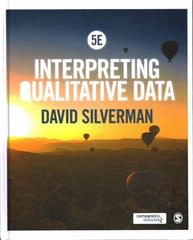Question
Case Scenario : Thomas is a 25 year old biracial male who is referred to addiction treatment services from his local probation and parole office.
Case Scenario:
Thomas is a 25 year old biracial male who is referred to addiction treatment services from his local probation and parole office. Thomas has received 3 DUI charges within the last two years and presents with a significant history of alcohol usage and dependence. Thomas discloses that he began his alcohol usage when he was 10 years old after seeing his older brother and parents use alcohol "for just about everything, if they were happy, if they were sad, if they just wanted to relax. Sometimes I would think there was more booze in the house than water." Currently, Thomas describes his alcohol usage occurring on a daily basis, oftentimes 3-4x per day. He reports that he consumes 2-3 16oz bottles of beer in each sitting and consumes alcohol via oral methods. No other substance use is reported. Regarding his legal issues, Thomas reports that he has previously received a drunk in public charge 4 years ago however his probation is specifically for his 3 DUI charges which have resulted in his license being revoked. He is willing to participate in services and presents in the preparation stage of change (see the followingattachment Download attachmentif you are unfamiliar with the stages of change). Upon further assessing John, he reported a history of untreated mental illness particularly depression which has an onset of 4 years prior after the death of his mother. He reported not receiving any treatment regarding his grief and loss. At the time of your appointment, Thomas reported that he recently completed inpatient detoxification and has been sober for two days. He reports that prior to his detoxification, he would experience sweating, vomiting, blackouts and shaking when he tried to abstain from alcohol on his own which often resulted in him relapsing.
Tasks:
1. Decide which treatment model would be the most beneficial for the client and which treatment interventionwould be the most harmful.
Note: Please remember to justify your answer with knowledge of the specific classification of drug the person is using (alcohol) and information gained from this week's reading in the Fisher and Harrison text.
2. Considering his probation/parole involvement, what would be the best approach to support him in recovery while also adhering to the requirements of your referral source?
3. If you were to work with this client as a human service practitioner in addiction treatment, what areas of need could you apply motivational interviewing?
Step by Step Solution
There are 3 Steps involved in it
Step: 1

Get Instant Access to Expert-Tailored Solutions
See step-by-step solutions with expert insights and AI powered tools for academic success
Step: 2

Step: 3

Ace Your Homework with AI
Get the answers you need in no time with our AI-driven, step-by-step assistance
Get Started


